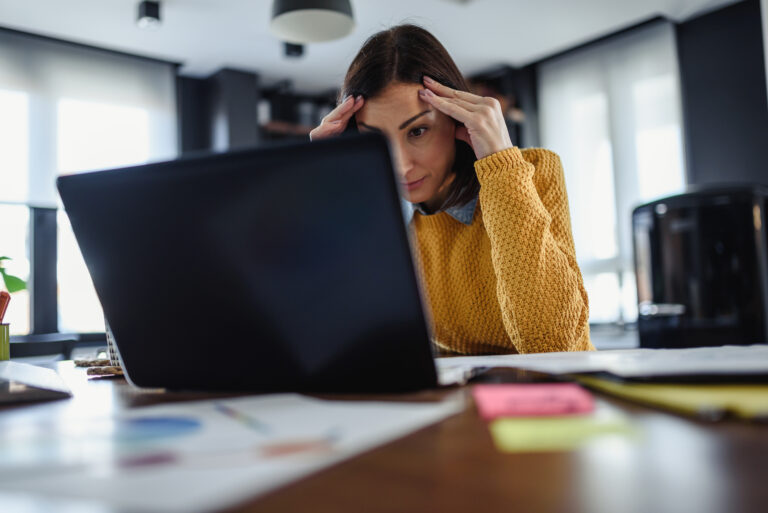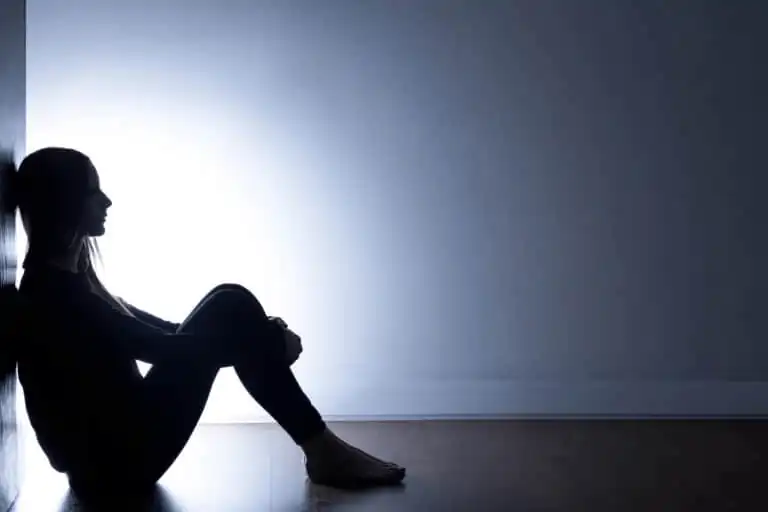Have you recently been making excuses to cancel plans, just because the thought of socialising makes you anxious? Do you have trouble sleeping? Or maybe it's getting out of bed in the morning which you find the most difficult? These are some of the earliest signs that you could be suffering from depression. You may also see these symptoms in a close friend or family member.
 There usually isn't just one specific sign that you or somebody else may be suffering from depression. People handle their thoughts in so many different ways, but there are nine things that usually stand out and could be an early sign that you're depressed.
There usually isn't just one specific sign that you or somebody else may be suffering from depression. People handle their thoughts in so many different ways, but there are nine things that usually stand out and could be an early sign that you're depressed.
 Sleep Problems
Not being able to get enough sleep is the most common type of sleep disturbance if you are depressed. This may include having difficulty falling asleep, waking up during the night and having difficulty falling back asleep or waking too early in the morning. Another type of sleeping problem includes oversleeping in the morning or sleeping during the day. Even with excess sleep, you may still feel tired and sluggish during the day.
Sleep Problems
Not being able to get enough sleep is the most common type of sleep disturbance if you are depressed. This may include having difficulty falling asleep, waking up during the night and having difficulty falling back asleep or waking too early in the morning. Another type of sleeping problem includes oversleeping in the morning or sleeping during the day. Even with excess sleep, you may still feel tired and sluggish during the day.

 If you know if you'd like to work in counselling but not sure which course to take or where to start - that's absolutely fine! We have friendly UK advisors who are happy to talk you through the different options and get you on your way to Building a Better You. You can call us on 0121 630 3000 or use our Live Chat feature on the website.
If you know if you'd like to work in counselling but not sure which course to take or where to start - that's absolutely fine! We have friendly UK advisors who are happy to talk you through the different options and get you on your way to Building a Better You. You can call us on 0121 630 3000 or use our Live Chat feature on the website.
 There usually isn't just one specific sign that you or somebody else may be suffering from depression. People handle their thoughts in so many different ways, but there are nine things that usually stand out and could be an early sign that you're depressed.
There usually isn't just one specific sign that you or somebody else may be suffering from depression. People handle their thoughts in so many different ways, but there are nine things that usually stand out and could be an early sign that you're depressed.
Helplessness
Do you sometimes feel like there's nothing you could do to make yourself feel better? Helplessness is the feeling that reflects a negative view of yourself. Self-esteem suffers, self-confidence is affected, and you may not believe you have any control towards helping yourself feel better. You may give up and think, "What's the use?" - this is an early sign of depression.Guilt
You may tend to think of yourself in very negative, unrealistic ways. You may become preoccupied with past "failures," personalise trivial events, or believe that minor mistakes are proof of your inadequacy. For example, someone that works in sales may spend a great deal of time blaming themselves for not meeting certain sales targets, even when the overall sales of cars in the area is down and other colleagues may be having a similar difficulty.Energy Loss
Fatigue, or energy loss, is another one of the early signs of depression. You may feel tired even without having engaged in any physical activity. Straight-forward day-to-day tasks are no longer simple. Sometimes just getting up and dressed in the morning may seem overwhelming and may take twice as long as usual. When you are doing things around the house or at work, you may become exhausted or get tired quickly.Loss of Interest in Daily Activities
When you become depressed you may lose interest in things you once found enjoyable. Activities such as going out to dinner or to cinema; visiting friends; working, or doing hobbies are just not as interesting or enjoyable as they once were. This includes a noticeably decreased sex drive. Sleep Problems
Not being able to get enough sleep is the most common type of sleep disturbance if you are depressed. This may include having difficulty falling asleep, waking up during the night and having difficulty falling back asleep or waking too early in the morning. Another type of sleeping problem includes oversleeping in the morning or sleeping during the day. Even with excess sleep, you may still feel tired and sluggish during the day.
Sleep Problems
Not being able to get enough sleep is the most common type of sleep disturbance if you are depressed. This may include having difficulty falling asleep, waking up during the night and having difficulty falling back asleep or waking too early in the morning. Another type of sleeping problem includes oversleeping in the morning or sleeping during the day. Even with excess sleep, you may still feel tired and sluggish during the day.
Weight Changes
Fluctuations in weight are common, but if you've recently gained or lost a significant amount of weight, this could be a sign that you have depression. Some people turn to food and 'comfort eat' to cope with the feelings mentioned above. Other people stop eating altogether.Lack of Concentration
If you're struggling to concentrate at work or on a task at home, could be a sign you're depressed. Depression is notorious for causing difficulty in thinking, concentration, memory, and decision-making.
Anger
When you're depressed, it's easy to become angry or frustrated. A lack of sleep, unhappiness with how you look, and helplessness can make you 'snap' at the tiniest thing, which could be directed at a loved one.Thoughts of Death
Thoughts of death, suicide, or even suicide attempts can be common if you are depressed. The frequency and intensity of thoughts about suicide can be wide-ranging from believing that friends and family would be better off if you were no longer here, to detailed plans about how you would actually carry out the act of suicide. People who are less severely suicidal may have short, but regular (a few times a week) thoughts of suicide. A person who is more severely suicidal may have made specific plans, collected materials (i.e., pills, gun, rope), and decided upon a day and location for the suicide attempt. The motivation for a person to want to kill him- or herself may not be for the desire to actually die. It may be due to the wish to give up in the face of what seems for the person to be overwhelming obstacles, or the desire to end the emotional pain that seems to have no end. If you are having suicidal thoughts, making plans for an attempt, or you have intentions for a suicide attempt, it is extremely important that you seek help immediately. Samaritans (116 123) operates a 24-hour service available every day of the year. If you prefer to write down how you're feeling, or if you're worried about being overheard on the phone, you can email Samaritans at jo@samaritans.org.Causes of Depression
Depression and anxiety can be caused by simple genetics or difficult experiences, and in that scenario, it boils down to how the individual can cope with those experiences. A few examples being childhood trauma, alcoholism, emotional or physical abuse, or neglect. Depression can develop over time in an individual, regardless of age. It is important to recognise the symptoms and take a measured approach to try and feel like yourself again. Common causes of depression include:- Stressful events - including unemployment spells and family bereavement
- Personality types - such as possessing low self-esteem or being excessively self-deprecating
- Family history - if someone in your family had depression in the past, be it a parent or sibling, it is more likely that you'll develop it
- Pregnancy - postnatal depression is commonly spoken about, but depression whilst being pregnant isn't quite as publicised; it is a very real possibility
- Loneliness - not having a healthy enough relationship with family and friends can bring on depression
- Alcohol and drugs - the euphoria of intoxication does not last; being sober after drug and alcohol abuse can lead to bouts of depression
Working with People with Depression
If you're a caring and understanding individual, with the ability to be sensitive and good listening skills, you could be unbelievably successful as a counsellor. Becoming a counsellor involves developing an understanding of the person, what they've been through, how this affects them, and why. Counsellors provide support, understanding, and potential treatment for adults and teenagers who suffer from mental illnesses such as eating disorders, anxiety, schizophrenia and depression. These are just a few illnesses that can affect just 1 in 4 people on average. The starting salary for a counsellor is between £20,000 to £26,000 per year, rising to £30,000 to £40,00 with experience and supervisory responsibilities. We have a number of Counselling courses at Oxbridge, from more broad courses such as Counselling Skills Level 2 (RQF) and Counselling Diploma Level 3 to more specific courses such as Drug and Alcohol Counselling Level 3. If you know if you'd like to work in counselling but not sure which course to take or where to start - that's absolutely fine! We have friendly UK advisors who are happy to talk you through the different options and get you on your way to Building a Better You. You can call us on 0121 630 3000 or use our Live Chat feature on the website.
If you know if you'd like to work in counselling but not sure which course to take or where to start - that's absolutely fine! We have friendly UK advisors who are happy to talk you through the different options and get you on your way to Building a Better You. You can call us on 0121 630 3000 or use our Live Chat feature on the website.